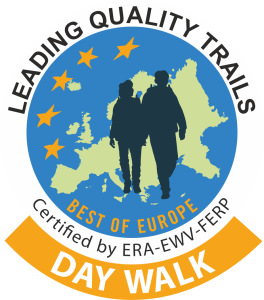
Trail managers may have several reasons to pursue the certification of their trails as Leading Quality Trails.
Here are some key benefits you can expect:
- Prestige and Recognition: Being certified as an LQT-BE, Day Walk brings prestige and recognition to trail managers and your respective trails. It signifies that your trail has met rigorous quality standards and has been acknowledged as one of the best in Europe. This recognition enhances the reputation of the trail and increases its visibility among walkers and outdoor enthusiasts.
- Increased Trail Usage: The LQT-BE, Day Walk certification acts as a powerful marketing tool. It attracts more walkers to the certified trail, as it assures them of a high-quality experience. Increased usage of the trail can lead to a boost in visitor numbers, benefiting local businesses and the surrounding community.
- Quality Assurance: The certification process for LQT-BE, Day Walk involves a thorough evaluation of the trail’s attributes, including the quality of the route, its natural and cultural features, infrastructure, and overall management. By going through this process, trail managers gain valuable insights and recommendations for improving and enhancing the trail’s quality. It serves as an opportunity to identify areas of improvement and ensure that the trail maintains a high standard.
- Networking and Collaboration: The LQT-BE, Day Walk network provides a platform for trail managers to connect and collaborate with other certified trails across Europe. This network allows you to share best practices, exchange ideas, and learn from each other’s experiences. Collaborative initiatives can lead to improved trail management techniques, knowledge sharing, and joint marketing efforts, further enhancing the overall quality of the trails.
- Sustainable Development: The LQT-BE, Day Walk certification promotes sustainable tourism development. It encourages trail managers to focus on preserving and protecting the natural and cultural heritage along the trail. By implementing sustainable practices, trail managers contribute to the long-term conservation of the trail and its surroundings, ensuring its enjoyment for future generations.
- Marketing and Promotion: The LQT-BE, Day Walk certification offers trail managers an enhanced marketing and promotional platform. The certification can be used in advertising campaigns, brochures, websites, and other promotional materials to attract walkers and outdoor enthusiasts. The recognized brand and reputation associated with Leading Quality Trails can significantly increase the trail’s visibility and attract a broader audience.
- Economic Impact: Certified LQT-BE, Day Walks have the potential to generate economic benefits for the surrounding communities. Increased visitor numbers can lead to more spending on accommodation, dining, local attractions, and services, stimulating the local economy. This, in turn, can encourage investment in infrastructure, job creation, and overall economic growth in the area.
- Tourism Development: The certification contributes to the development of walking tourism in the region. By offering a high-quality trail experience, trail managers can position your destinations as attractive walking destinations. This can lead to the development of tourism-related services and facilities, such as guided tours, equipment rentals, interpretation centers, and accommodation options, further supporting the growth of the tourism sector.
- Collaboration with Stakeholders: The certification process for LQT-BE, Day Walk involves engaging with various stakeholders, including local communities, landowners, tourism organizations, and environmental agencies. This collaboration fosters positive relationships and strengthens partnerships among these stakeholders. By working together, trail managers can tap into local expertise, resources, and support, ensuring the sustainable management and development of the trail.
- Educational and Interpretive Opportunities: The LQT-BE, Day Walk certification encourages trail managers to provide educational and interpretive materials along the trail. This can include informational signage, interactive exhibits, educational programs, and guided tours. Such initiatives not only enrich the walkers’ experience but also contribute to raising awareness and understanding of the trail’s natural, cultural, and historical significance.
- Feedback and Continuous Improvement: The certification process provides an opportunity for trail managers to receive feedback and recommendations from evaluators and experts. This feedback can help identify areas for improvement and inspire ongoing efforts to enhance the trail’s quality and visitor experience. It allows trail managers to stay proactive and continuously strive for excellence.
In summary, obtaining the certification as a LQT-BE, Day Walk provides trail managers with recognition, increased usage, quality assurance, networking opportunities, and a platform for sustainable development. These benefits contribute to the overall success and sustainability of the trail, benefiting both the trail managers and the local communities.
Furthermore the benefits of the certification include improved marketing and promotion, economic impact, tourism development, collaboration with stakeholders, educational opportunities, and continuous improvement through feedback. These advantages support the overall success, sustainability, and positive impact of the trail and its management.
Economic benefits
Obtaining the LQT-BE, Day Walk certification can bring several economic benefits to trail managers and the surrounding communities:
- Increased Tourism Revenue: The certification attracts more visitors to the trail, resulting in increased tourism revenue. Walkers and outdoor enthusiasts who specifically seek out high-quality trails are more likely to spend money on accommodation, meals, transportation, equipment rentals, and other services in the local area. This spending can have a positive impact on local businesses and stimulate economic growth.
- Job Creation: A rise in visitor numbers and tourism-related activities along the trail can create employment opportunities in the local community. Trail managers may need additional staff for trail maintenance, visitor services, interpretation, guiding, and administration. Moreover, the increased demand for goods and services by visitors can lead to job creation in sectors such as hospitality, food services, retail, and transportation.
- Support for Local Businesses: The influx of visitors to the certified trail benefits local businesses directly. Accommodation providers, restaurants, cafes, souvenir shops, outdoor equipment rental companies, and other local businesses catering to the needs of walkers can experience an upsurge in demand. This increased business can boost your revenue and help you thrive, particularly during peak tourism seasons.
- Investment in Infrastructure: The economic benefits generated by a LQT-BE, Day Walk can attract investment in infrastructure development and improvement. Local authorities and tourism organizations may recognize the potential of the trail and allocate resources to enhance amenities such as parking areas, restrooms, picnic spots, viewpoints, and trail signage. Improved infrastructure not only enhances the visitor experience but also supports long-term tourism growth and sustainability.
- Extended Visitor Stays: LQT-BE, Day Walks often offer multi-day or interconnected trail systems, encouraging visitors to stay longer in the area. This can lead to increased overnight stays in accommodations, benefiting hotels, guesthouses, campsites, and other lodging establishments. Longer visitor stays also provide opportunities for visitors to explore other local attractions, engage in additional activities, and spend more on local products and services.
- Destination Differentiation: The LQT-BE, Day Walk certification sets a trail apart as a premier destination, differentiating it from other trails and attracting walkers who prioritize quality experiences. This distinction can lead to the trail becoming a sought-after destination, drawing visitors from farther distances and potentially increasing the length of their stay. This differentiation can also help to diversify the tourism offerings of a region and reduce dependency on seasonal or single-sector tourism.
In summary, the economic benefits of having a trail certified as a LQT-BE, Day Walk include increased tourism revenue, job creation, support for local businesses, investment in infrastructure, extended visitor stays, and destination differentiation. These benefits contribute to the economic prosperity of trail managers and the surrounding communities, fostering sustainable tourism development and growth.
